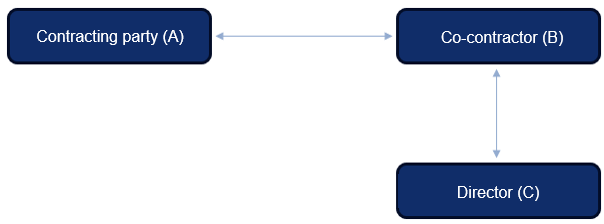1. The old regime
Context. On 1 February 2024, the law introducing Book 6 of the Civil Code (the CC) was passed. On 1 January 2025, Book 6 will enter into force. For company directors, the most relevant innovation is undoubtedly the abolition, through Article 6.3 CC, of the jurisprudence developed by the Court of Cassation since the 1970s on the so-called doctrine of the concurrence prohibition and the quasi-immunity of the executing agent. This change of direction raises a number of questions about the extra-contractual liability of executing agents (henceforth referred to as auxiliary persons), which was not previously an issue in principle. Traditionally, the term "executing agent" or " auxiliary person" is thought to include subcontractors, but it also includes directors and employees of a company if they are involved in the performance of a contract.
For example, suppose the co-contractor (B) of a contracting party (A) breaches its duty to deliver and a director (C) of the co-contractor is responsible for the faulty delivery. Who can then be sued and on what legal basis?

Before 1 January 2025: quasi-immunity of the executing agent. Based on case law, for the time being, the contracting party (A) can only sue its co-contractor (B) for damages caused by the latter's contractual breach and only on a contractual basis. A non-contractual claim (i.e. based on a breach of law or a breach of the general duty of care) against co-contractor (B) is not possible unless the facts constituting a contractual breach also qualify as a criminal offence. This is known as the concurrence prohibition.
That impossibility to extra-contractually claim for damages caused by a contractual default from a co-contractor was extended by the cassation judgment to the co-contractor's auxiliary persons (B). These are the persons engaged by a party to perform its contractual obligations, such as subcontractors, employees or directors (when the latter act in performance of the contract entered into by the company). Thus, if a director (C) is responsible for the non-performance of the obligation to deliver by co-contractor (B), then under the prevailing law, contracting party (A) cannot in principle (except in the case of a criminal offence) sue that director (C). This cannot be done on a contractual basis - after all, there is no contractual relationship between A and C - but neither can it be done on an extra-contractual basis.
2. The new regime
From 1 January 2025: abolition of quasi-immunity. The new Article 6.3 CC will do away with this traditional case law. The first paragraph of Article 6.3, §2 CC stipulates: "Unless the law or the contract provides otherwise, the legal provisions on extra-contractual liability apply between the aggrieved party and the auxiliary person of his co-contracting parties." Thus, the contracting party (A) can now indeed sue the auxiliary person (C) of his co-contractor (B) extra-contractually, on the understanding that a number of protection mechanisms were provided when it comes to damages caused by the auxiliary person’s contractual default.Protection mechanisms. Auxiliary person (C) may invoke against contracting party (A) the defenses arising from the "main contract" between contracting party (A) and co-contractor (B) (and the special legal rules applicable to it) (Article 6.3, §2, (2) CC). For example, if the liability in the contract between contracting party (A) and co-contractor (B) is validly limited to a maximum of the price to be paid for the delivery, then the director-auxiliary person (C) can also invoke this limitation himself when he is sued extra-contractually by contracting party (A), even if the effective damages are higher.
Further, auxiliary person (C) may rely against contracting party (A) on the defenses arising from its own "subcontract" with co-contractor (B) (and the special legal rules applicable to it) (Article 6.3, § 2, (3) CC). Suppose, for example, that auxiliary person (C) is an independent subcontractor who has limited his liability in his contract with the main contractor (B) to no more than the amount of the services rendered, then auxiliary person (C) can invoke this when he is sued extra-contractually by the client (A) for the full amount of the damages. This is less relevant for the auxiliary person (C) whose liability cannot be limited by the company beyond what is legally provided in the Belgian Code of Companies and Associations (the BCCA) and whose liability cannot be exonerated or indemnified in advance (Article 2:58(1) and (2) BCCA).
As an exception to the effect of contractual defenses, if auxiliary person (C) committed an error with the intention of causing damage, the effect does not play. Nor does it come into play to the extent that contracting party (A) suffered physical or psychological damage.
In principle, we deem it possible to exclude the extra-contractual liability of the directors in the main contract, as is the case for other auxiliary persons, although this reading of Art. 2:58 BCCA has yet to be confirmed by case law.
Existing defences. In addition, auxiliary persons also have a number of pre-existing defenses separate from the new statutory regime under Article 6.3 CC. Employees of the company can, for example, invoke the limited liability immunity they enjoy under employment law. They are liable both to their employer and to third parties, including co-contractors of the employer, only for their gross negligence (“zware fout” / “faute lourde”), their intentional fault (“opzettelijke fout” / “faute intentionnelle”), as well as for their minor negligence if it occurs repeatedly rather than accidentally (“lichte fout die gewoonlijk voorkomt” / “faute légère à caractère habituel”), but not for their accidental minor fault (this relies for contractual staff on Article 18 of the law of 3 July 1978 and for statutory staff on the law of 10 February 2003). Directors of legal entities do not enjoy such immunity, but their potential liability in the event of an accidental minor fault is limited to the maximum amounts specified in Article 2:57 BCCA, which vary depending on the size of the company. Moreover, directors are expressly subject to a 'marginal review' of their actions (Article 2:56 BCCA). Thus, directors are liable only for decisions, acts or conduct that are manifestly outside the margin within which normal prudent and careful directors, placed in the same circumstances, may reasonably have a different opinion. In addition, the company may take out "D&O" insurance for its directors to cover their liability for extra-contractual claims by co-contractors.
3. Impact on directors and other auxiliary persons
Potentially real impact. As a result of this change in the law, a co-contractor of a company will henceforth find it easier to directly sue and/or involve auxiliary persons of a company in proceedings with the company. It remains to be seen whether this will actually become an established practice. For instance, it will not always be strategically in the contracting party/claimant's interest to involve directors and employees, as this may complicate the contractual proceedings. On the other hand, it may well increase the pressure on the parties to reach an amicable settlement more quickly.
Application of the law over time. As cited above, Book 6 CC enters into force on 1 January 2025. According to some, a contracting party can sue the auxiliary person of his co-contractor extra-contractually for his wrongful acts or omissions committed after that date, even if the main contract predates that date. Others believe that it is more logical in that situation to build on the former cassation case law that, by concluding the main contract, the parties implicitly agreed to seek redress for breach of contract only on the basis of the contractual relationship that binds them, to the exclusion of an extra-contractual claim (between them or against each other's auxiliary persons), except in the case of a criminal offence. Indeed, under that reasoning, the parties would be entitled to legitimately rely on the fact that the auxiliary persons enjoyed the then-current quasi-immunity of the auxiliary persons. It remains to be seen in which direction case law will develop. Directors seem to be able to rely on it only if their mandate was not renewed on or after 1 January 2025.
4. Additional measures - what about my existing contracts?
Deviating contractual arrangements. One may consider, when negotiating new contracts, excluding the extra-contractual liability between the parties and of their respective auxiliary persons, and to revive the old quasi-immunity rule by contract, as it were. To this end, the following model clause can be used:
Each party hereby excludes any extra-contractual liability related to the formation, performance, and termination of this agreement [(and guarantees that its affiliated persons exclude this)] with respect to any other party and the [directors, employees, shareholders, and] direct or indirect auxiliary persons of such other party [and its affiliated persons] to the fullest extent permitted by law (including gross negligence).To the extent that group companies act as a single economic entity, it may be useful to add a guarantee that the to the contracting party (A) related persons will also waive claims based on extra-contractual liability. This avoids that the contractually provided liability limitations are still circumvented via a claim by another company of the group to which the contracting party (A) belongs.
The exclusion of extra-contractual liability may be limited to effective auxiliary persons, in particular those involved in the performance of the contract. It may also be extended to non-auxiliary persons (directors, employees and/or shareholders, even if they are not involved in the performance of the contractual obligations), without prejudice to any special imperative liability rules.
Existing contracts. The advantage of the contractual exclusion of extra-contractual liability is that it provides legal certainty for auxiliary persons whose liability might be compromised. With regards to existing contracts, the co-contractor must in principle agree to this, as it is an adaptation of the existing contract (unless that exclusion is at least implicitly desired by the parties, if the agreement predates the change in law discussed here, as explained in marginal 7).
***
The above explanation does not constitute legal advice. It merely outlines the general framework, disregarding the limited exceptions and numerous questions of interpretation. For all your specific questions: contact your usual Eubelius contact, who will put you in touch with one of our specialists if necessary.




